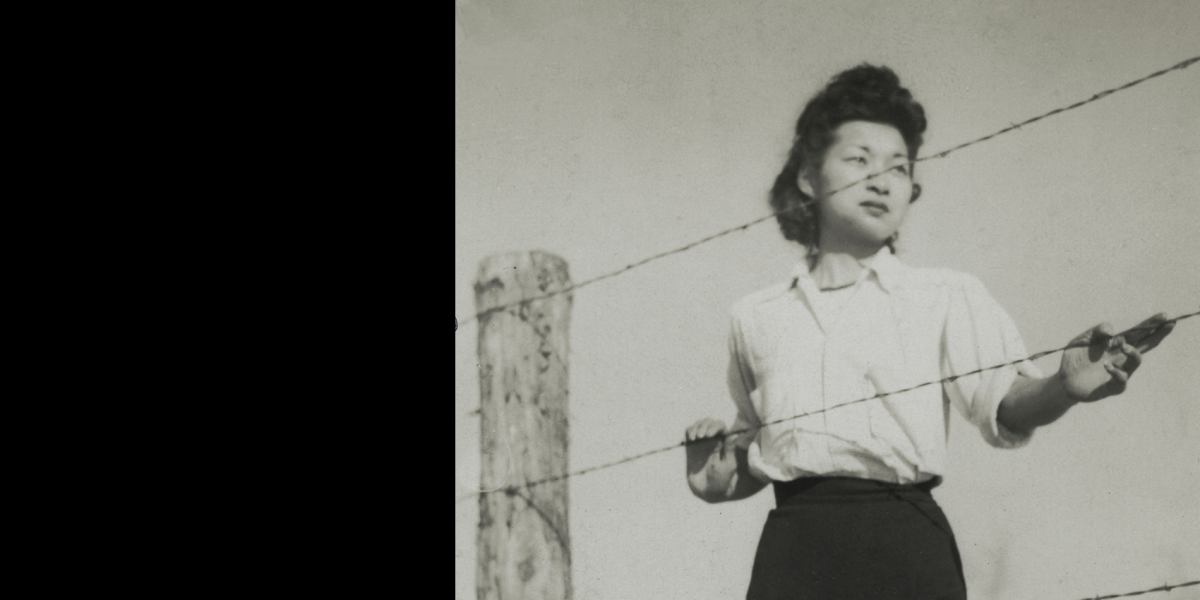
Past Exhibition

Don’t Fence Me In
COMING OF AGE IN AMERICA’S CONCENTRATION CAMPS
Resources
Don’t Fence Me In: Coming of Age in America’s Concentration Camps explores the experiences of Japanese American youth who asserted their place as young Americans confronting the injustice of being imprisoned in World War II concentration camps.
Check out our resources including:
- A video about conserving a Boy Scout drum
- An activity guide created by JANM’s Education Unit to accompany the exhibition
- Related stories from Discover Nikkei
Resources
March 04 - October 01, 2023
Japanese American National Museum
100 North Central Avenue
Los Angeles, CA 90012
Resources
Don’t Fence Me In: Coming of Age in America’s Concentration Camps explores the experiences of Japanese American youth who asserted their place as young Americans confronting the injustice of being imprisoned in World War II concentration camps.
Check out our resources including:
- A video about conserving a Boy Scout drum
- An activity guide created by JANM’s Education Unit to accompany the exhibition
- Related stories from Discover Nikkei
Resources
March 04 - October 01, 2023
Japanese American National Museum
100 North Central Avenue
Los Angeles, CA 90012
Resources
Don’t Fence Me In: Coming of Age in America’s Concentration Camps explores the experiences of Japanese American youth who asserted their place as young Americans confronting the injustice of being imprisoned in World War II concentration camps.
Check out our resources including:
- A video about conserving a Boy Scout drum
- An activity guide created by JANM’s Education Unit to accompany the exhibition
- Related stories from Discover Nikkei
Exhibition Resources
UNBOXED: Conserving History
JANM’s Collections department provides a glimpse into the conservation process of one of its most cherished artifacts: Bob Uragami’s Boy Scout drum. Learn of the drum’s storied history, and uncover some of the work that happens behind-the-scenes to care for the unique artifact.

Activity Guide
This guide was created by JANM’s Education Unit to accompany Don’t Fence Me In and includes fun activities that encourages young visitors to reflect and engage with the exhibition.
Printed copies are available in the exhibition, but we invite you to download a PDF version. Although written for exploring the exhibition, the activities can be adapted for use at home.
Related Resources

Swing Dance and Music in Camp
Learn how Don’t Fence Me In explores the ways that preteens, teenagers, and young adults danced with one another, listened to jazz and big band music, and formed musical groups of their own that performed regularly in the World War II camps.

City Girls: The Nisei Social World in Los Angeles, 1920-1950
A 2014 interview with Valerie Matsumoto about her book, City Girls: The Nisei Social World in Los Angeles, 1920-1950, in which the author zeroed in on the lives of Nisei women in Los Angeles and their exploits of club and community involvements spanning three decades—prewar, World War II, and postwar.

An excerpt from Unforgotten Voices from Heart Mountain: As American As Apple Pie—Yellowstone
These are unforgettable voices of Japanese Americans, many of them young people who were imprisoned during WWII, as well as those who imprisoned them, and townspeople in the harsh high desert of Wyoming.
